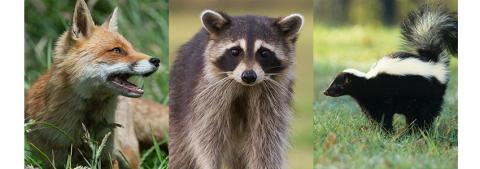
Thornton Harvest Fest
Saturday, Sept. 10, 10 a.m. - 5 p.m.
Community Park
York St. and Thornton Parkway, Thornton
More information


DENVER - After seeing cases of rabies in skunks out of Larimer County and canine distemper from raccoons in Adams County, Colorado Parks and Wildlife reminds residents of the importance to get their pets vaccinated and to always avoid touching any wildlife.
In Larimer County, a large number of skunks did not head into their dens for the winter and the cases seen from those that had contact with dogs were positive for rabies. Larimer County officials have seen more than a dozen positive rabies cases this year.
Wildlife pathologists at CPW’s health lab have a raccoon carcass taken out of Brighton that was positive for the canine distemper virus (CDV). Officials advise the public to treat any raccoon in Adams County with the presumptive diagnosis of CDV until the summer when CPW will restart surveillance.
“We see these cases every year, so it is important that the public is aware of these diseases and also knows what to do,” said CPW Area Wildlife Manager Crystal Chick. “You need to protect your pets and make sure they are vaccinated. Keeping your pets on a leash and from running at large helps protects them as well as our wildlife.”
Key points for residents on disease and animal interactions:
The Colorado Department of Public Health and Environment (CDPHE) is responsible for managing human and domestic animal health concerns for rabies virus transmission, and all cases with human or domestic animal exposure should be referred to CDPHE.
Rabies is a fatal disease of the nervous system caused by a virus and is usually transmitted through the bite of an infected animal. After a bite occurs, the virus multiplies near the wound, enters nearby nerves and eventually travels to the spinal cord and brain.
Rabies virus is regularly found in Colorado and currently occurs as two strains of the virus: skunk rabies and bat rabies. While rabies viruses of any strain can infect any mammal, skunks and bats are the most likely species in Colorado to harbor and transmit rabies virus infections. For this reason, skunks and bats pose the highest risk to human and domestic animal health in Colorado. Aggressive vaccination immediately following exposure may prevent infection in humans (called “post‐exposure prophylaxis”).
Rabies | What to look for:
Canine distemper is a neurological disease, and the initial signs can include lethargy, runny eyes and nose and diarrhea in the affected animal. In advanced stages, the animal may appear thin and may walk in circles or appear disoriented.
Although distemper is not transmitted to humans, dogs are susceptible to the disease if they have not been vaccinated. Because there is no treatment for the disease, prevention is the best method of control.
Dogs with distemper can also transmit the disease to raccoons, which could in turn pass it to other raccoons or pets.
If members of the public observe a wild animal with unusual symptoms, the public is to contact their local public health officials.
The Larimer County public health number is 970.498.6775. For Adams County, contact its animal management department at 303.288.1535.